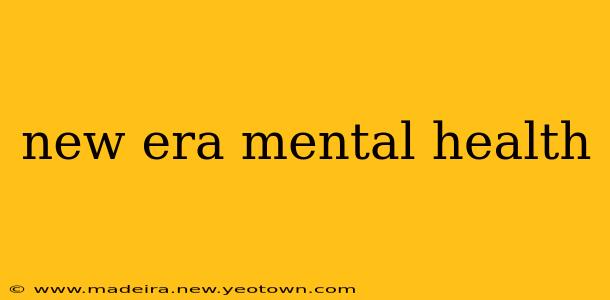The world is changing, and so is our understanding of mental health. What was once shrouded in stigma and misunderstanding is now, thankfully, emerging into the light. We're entering a new era, one characterized by increased awareness, innovative treatments, and a growing emphasis on preventative care. But this journey isn't without its challenges. Let's explore this evolving landscape, examining the key shifts and addressing some of the most pressing questions.
What are the biggest changes in mental health in recent years?
The past decade has witnessed a remarkable shift in how we perceive and address mental health. Gone are the days when discussing mental illness was taboo. Now, conversations about anxiety, depression, and other conditions are becoming increasingly commonplace, thanks in part to increased media attention and the courageous voices of individuals sharing their personal stories. This increased visibility has helped to destigmatize mental health issues, making it easier for people to seek help without shame.
Simultaneously, we've seen advancements in treatment options. Therapies like Cognitive Behavioral Therapy (CBT) and Dialectical Behavior Therapy (DBT) have become more widely available and accessible. The development of new medications has also provided additional tools for managing various mental health conditions. Furthermore, technology is playing a significant role, with the rise of telehealth platforms offering convenient and accessible mental health services, particularly beneficial for those in rural areas or with mobility challenges.
How has technology impacted mental health treatment and awareness?
Technology's impact is profound and multifaceted. Telehealth platforms, as mentioned, have revolutionized access to care, breaking down geographical barriers and offering greater convenience. Mental health apps provide tools for self-management, including mindfulness exercises, mood trackers, and cognitive restructuring techniques. Social media, while potentially a source of anxiety for some, can also be a powerful tool for raising awareness, fostering community, and connecting individuals with support networks.
However, it’s crucial to acknowledge the potential downsides. The constant connectivity can exacerbate feelings of inadequacy or social comparison, leading to increased anxiety and depression in vulnerable individuals. The proliferation of misleading or inaccurate information online also poses a challenge. Therefore, a critical approach to online mental health resources is essential.
What are the most common mental health concerns today?
Anxiety and depression remain the most prevalent mental health concerns globally. However, we're also seeing a rise in other conditions, such as:
- Burnout: The relentless pressure of modern life is contributing to increased rates of burnout, characterized by emotional exhaustion, cynicism, and reduced professional efficacy.
- Trauma-related disorders: The impact of trauma, whether experienced personally or vicariously, is increasingly recognized, leading to a greater understanding of Post-Traumatic Stress Disorder (PTSD) and other trauma-related conditions.
- Body image issues: The pervasive influence of social media and unrealistic beauty standards is fueling body image concerns and eating disorders, particularly among young people.
It's important to note that these conditions often coexist, making integrated and holistic approaches to treatment essential.
What are some preventative measures for maintaining good mental health?
The good news is that many strategies can contribute to good mental health. These preventative measures include:
- Prioritizing self-care: This encompasses activities that promote physical and emotional well-being, such as regular exercise, healthy eating, sufficient sleep, and engaging in hobbies.
- Building strong social connections: Maintaining supportive relationships provides a crucial buffer against stress and loneliness.
- Practicing mindfulness and stress management techniques: Techniques like meditation and deep breathing can help regulate emotions and reduce stress.
- Seeking professional help early: Don't hesitate to seek support from a mental health professional if you're struggling. Early intervention can significantly improve outcomes.
How can I find mental health resources in my area?
Many resources are available depending on your location and insurance coverage. Your primary care physician can be a valuable starting point, providing referrals to therapists, psychiatrists, or other mental health professionals. Online directories and helplines offer additional avenues for locating mental health services in your area. Remember, seeking help is a sign of strength, not weakness.
The new era of mental health is defined by a growing awareness, increased access to care, and a more compassionate understanding of mental illness. While challenges remain, the progress made is significant and offers hope for a future where mental well-being is prioritized and celebrated.

